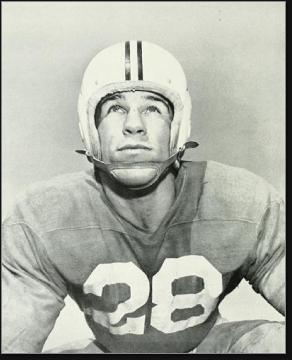
Sport: Football
Born: September 16, 1927
Died: April 29, 2005
Towns: Elizabeth & Jefferson Twp., New Jersey
Robert Richard Ward was born September 16, 1927 in Elizabeth, NJ. The son of a police detective, Bob was quick, strong and aggressive. He was a star for his high school football team in Jefferson Township, where he played the line despite standing just 5’9”. After graduation, Bob enlisted in the Army at the end of World War II and underwent paratrooper training.
Bob was assigned to Fort Benning, where he played for the base football team. The team’s coach tipped off Alabama’s new coach, Harold Drew, but it was a little too late: word of Bob’s prowess had leaked out and Maryland coach Jim Tatum swooped in and signed him up. Bob joined the Terrapins in 1948.
Bob was the smallest member of Maryland’s line, but he consistently outplayed bigger, stronger opponents. In 1949, the Terps went 8–1 and finished with a #14 national ranking. They scored a 20–7 win in the Gator Bowl over Missouri and Bob was named MVP. In 1950, as a junior, Bob was a first-team All-American on defense at middle guard as Maryland went 7–2–1.
Bob’s senior season saw him gain first-team All-American status once again, this time on offense. It was the first time a player had earned this honor in successive seasons on each side of the ball. Maryland ran the table that year, going 10–0 and finishing with a #3 national ranking.
Bob’s final college game was an epic 28–13 upset of top-ranked Tennessee in the Sugar Bowl. One of the game’s key plays was a tackle that jarred the ball loose from Hank Lauricella of the Vols, which led to a Terrapin touchdown. Bob was named team MVP that season—the fourth year in a row he earned this honor. He was commonly referred to as college football’s greatest “pound-for-pound” player.
Bob played one more football game, as captain of the College All-Stars in the summer of 1952. They lost to the Rams, 10–7.
Too small to be an impact player in the NFL, Bob turned down pro offers and began his coaching career as an assistant to Tatum at Maryland. After working as an assistant at Iowa State, Oklahoma and Army, he got his dream job as head man at Maryland in 1967. Unfortunately, the program was in disarray and the players did not respond to his coaching style. He resigned after two losing seasons.
n 1980, he was elected to the College Football Hall of Fame. One of Bob’s three sons, Kelly, was a three-time All-American wrestler for Iowa State. Bob suffered from Alzheimer’s in his later years. He passed away in 2005 at the age of 77.